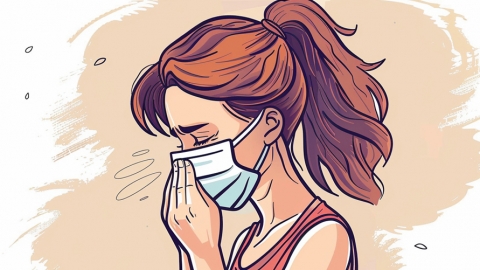What causes coughing and chest pain?
Generally, the main causes of chest pain associated with coughing include strain from severe coughing, prolonged poor posture, acute bronchitis, pneumonia, pleurisy, and others. If discomfort symptoms occur, it is recommended to seek timely medical consultation and treatment at a qualified hospital. Detailed explanations are as follows:
1. Strain from Severe Coughing
Frequent and intense coughing can repeatedly strain the chest muscles and fascia, causing minor injuries to local tissues and resulting in chest pain that significantly worsens during coughing. Drink plenty of warm water daily to avoid irritating the respiratory tract and worsening the cough.

2. Prolonged Poor Posture
Poor postures such as long-term stooping or working at a desk can keep the chest muscles in a constant state of tension, affecting local blood circulation. Chest muscle strain increases during coughing, which can cause chest pain. Adjust your posture promptly, take regular breaks to stand up and move around during work, perform chest-expanding exercises to relax the chest muscles, and apply heat packs to the chest to improve blood circulation.
3. Acute Bronchitis
Acute inflammation of the bronchial mucosa caused by bacterial or viral infections leads to coughing due to inflammatory stimulation. Severe coughing can strain surrounding bronchial tissues, and the inflammation may spread to the vicinity of the pleura, causing chest pain. Treatment with medications such as amoxicillin capsules, cefuroxime axetil tablets, and ribavirin granules should be administered under a doctor's guidance.
4. Pneumonia
Inflammation caused by pathogen infection in the lungs irritates the lung tissue, leading to coughing and sputum production. When the pleura is involved, chest pain occurs, worsening with breathing and coughing. Prompt medical attention is necessary, and treatment with medications such as levofloxacin tablets, cefixime dispersible tablets, and azithromycin dispersible tablets should be administered under a doctor's guidance.
5. Pleurisy
Inflammation of the pleura caused by infections, autoimmune factors, and other influences makes the pleural surface rough. During respiration and coughing, the pleura rubs against each other, causing chest pain described as sharp or pulling in nature. Treatment of the underlying condition should be guided by a physician. For bacterial pleurisy, medications such as cefoperazone sodium and sulbactam sodium tablets and metronidazole tablets may be used. For tuberculous pleurisy, isoniazid tablets and rifampicin capsules are required. Additionally, rest is important, and strenuous activity should be avoided to prevent worsening pain.
In daily life, keep warm to avoid colds that can cause respiratory diseases, maintain good indoor air circulation, avoid exposure to dust, smoke, and other irritants, avoid excessive force when coughing to reduce injury to chest tissues, maintain regular sleep patterns, enhance physical resistance, and reduce the risk of illness.




